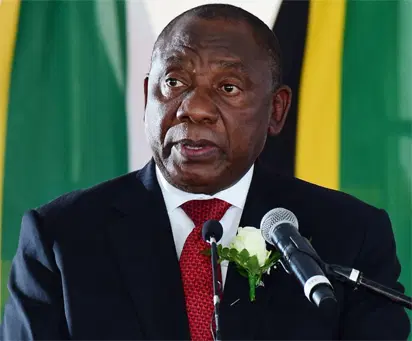South Africa has issued a firm ultimatum to Taiwan, demanding the relocation of its de facto embassy from Pretoria to another city by the end of March 2025. The decision, which has caused ripples in diplomatic circles, is said to be a response to increasing pressure from China, South Africa’s largest trading partner. This move highlights the ongoing friction over Taiwan’s international standing and its complicated diplomatic position.
In a statement released on February 3, Taiwan’s Foreign Ministry confirmed that it had received a letter from South Africa’s government in January, instructing the island’s de facto embassy—currently operating under the name “Taipei Liaison Office”—to vacate its premises in Pretoria by the end of March. The letter also suggested that the office be rebranded as a trade office, further diminishing its diplomatic status.
“This is a clear sign of pressure from China,” said a representative of Taiwan’s Foreign Ministry in an exclusive interview with Freedom Online. “South Africa, under increasing Chinese influence, is aligning its foreign policy with Beijing’s demands. The pressure on countries to endorse the ‘One China’ principle is real, and it is shaping our diplomatic engagements globally.”
South Africa’s foreign ministry, in a brief comment to Reuters, confirmed the request but refrained from offering further details. A spokesperson mentioned that “administrative matters related to the accurate representation of diplomatic classifications” were being discussed with the Taipei Liaison Office, hinting at a shift in how Taiwan’s representation would be handled moving forward.
Taiwan, which continues to reject China’s claim over the island, has condemned the move. “Taiwan has every right to maintain informal relations and cooperate with countries around the world, including South Africa,” the Taiwanese representative added. “China’s interference in South Africa’s internal and foreign policies is a stark reminder of the growing influence Beijing wields globally.”
Taiwan, which has diplomatic ties with only 12 countries globally, has lost several of its African allies in recent years. The island’s lone remaining ally on the continent is Eswatini, a small kingdom that is geographically encircled by South Africa. This makes Eswatini’s diplomatic support even more significant for Taiwan, as it struggles to maintain a presence in the region.
The ‘One China’ Principle and South Africa’s Strategic Ties with Beijing
South Africa’s decision to pressure Taiwan out of Pretoria comes at a time when the country is looking to deepen its relationship with China, especially in the realms of trade and energy. China is South Africa’s largest trading partner, and the two nations have been collaborating on several projects, including renewable energy and infrastructure development. South Africa has long maintained that it adheres to the ‘One China’ policy, which asserts that Taiwan is part of China, despite Taiwan operating as a self-governing democracy with its own government, military, and foreign relations.
China’s Foreign Ministry reacted swiftly to South Africa’s move, hailing it as a demonstration of “strong friendship” between the two countries. In an official statement, China reiterated its stance that Taiwan was an inseparable part of Chinese territory, and that “Taiwan independence will fail.” China’s growing influence in Africa has played a critical role in shifting diplomatic allegiances in favor of Beijing. South Africa’s position, however, is seen by many as a balancing act: on one hand, it must adhere to the ‘One China’ policy, while on the other, it must manage its relationship with Taiwan, which provides important trade and economic opportunities, particularly in the technology sector.
Taiwan’s Dwindling Diplomatic Space in Africa
Taiwan’s diplomatic isolation is not limited to South Africa. Over the last two decades, Taiwan has seen a steady decline in formal diplomatic recognition globally, particularly in Africa. This shift in alliances has coincided with Beijing’s increasing assertiveness in the region, offering substantial investments and trade deals in exchange for diplomatic recognition. With only a handful of countries, most of them in the Pacific and Latin America, continuing to maintain formal ties with Taiwan, the island’s international space has continued to shrink.
In Africa, Taiwan’s diplomatic presence has been confined to a small handful of countries. Eswatini remains Taiwan’s only African ally, and even this relationship is under scrutiny. Beijing has been vocal about its desire to see all African nations sever ties with Taiwan and join the growing ranks of countries that recognize the ‘One China’ principle. South Africa’s request to move Taiwan’s office is seen as another step in this broader geopolitical contest between Beijing and Taipei.
Eswatini’s position, however, is precarious. Surrounded by South Africa, a key player in African diplomacy, the kingdom’s allegiance to Taiwan has been tested by external pressure. Some analysts speculate that Eswatini may eventually be forced to shift its diplomatic allegiance as China continues to tighten its grip on African states.
The Future of Taiwan’s African Diplomacy
As Taiwan faces increasing challenges in Africa, the question arises: what does the future hold for its diplomatic efforts on the continent? Some observers believe that Taiwan’s position may become untenable in Africa, especially as China continues to expand its economic footprint across the region. However, Taiwan remains defiant, stressing that its right to self-determination and international engagement should not be denied by external forces.
Taiwan’s Foreign Ministry expressed hope that international support for its continued presence would persist, despite setbacks like the one in South Africa. “We will continue to strengthen our ties with countries that value democracy and free engagement, regardless of China’s attempts to isolate us,” the statement read.
For South Africa, this development underscores the delicate balancing act it must perform between maintaining a close relationship with China, its primary trading partner, and managing the political and diplomatic fallout from limiting Taiwan’s presence within its borders.

